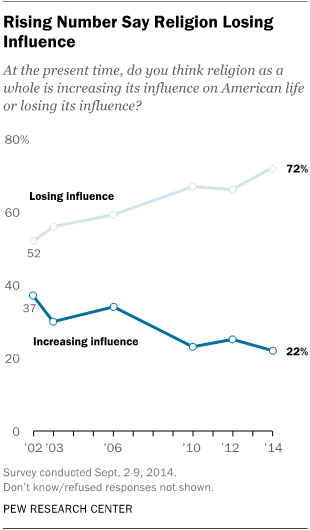 Nearly three-quarters of the public (72%) now thinks religion is losing influence in American life, up 5 percentage points from 2010 to the highest level in Pew Research polling over the past decade. And most people who say religion’s influence is waning see this as a bad thing.
Nearly three-quarters of the public (72%) now thinks religion is losing influence in American life, up 5 percentage points from 2010 to the highest level in Pew Research polling over the past decade. And most people who say religion’s influence is waning see this as a bad thing.
Perhaps as a consequence, a growing share of the American public wants religion to play a role in U.S. politics. The share of Americans who say churches and other houses of worship should express their views on social and political issues is up 6 points since the 2010 midterm elections (from 43% to 49%). The share who say there has been “too little” expression of religious faith and prayer from political leaders is up modestly over the same period (from 37% to 41%). And a growing minority of Americans (32%) think churches should endorse candidates for political office, though most continue to oppose such direct involvement by churches in electoral politics.
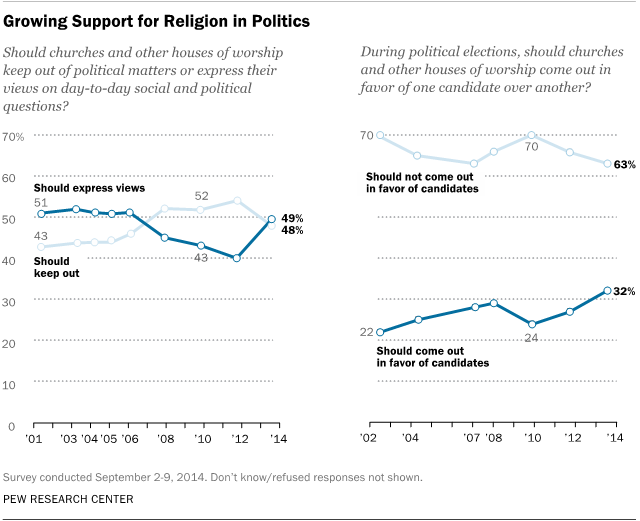
The findings reflect a widening divide between religiously affiliated Americans and the rising share of the population that is not affiliated with any religion (sometimes called the “nones”). The public’s appetite for religious influence in politics is increasing in part because those who continue to identify with a religion (e.g., Protestants, Catholics and others) have become significantly more supportive of churches and other houses of worship speaking out about political issues and political leaders talking more often about religion. The “nones” are much more likely to oppose the intermingling of religion and politics.
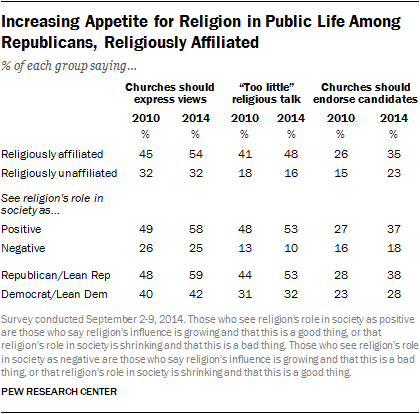 Analysis also shows that growing support for religion in politics is concentrated among those who think religion has a positive impact on society. And the desire for religion in public life is much more evident among Republicans and those who lean toward the GOP than among Democrats and Democratic leaners.
Analysis also shows that growing support for religion in politics is concentrated among those who think religion has a positive impact on society. And the desire for religion in public life is much more evident among Republicans and those who lean toward the GOP than among Democrats and Democratic leaners.
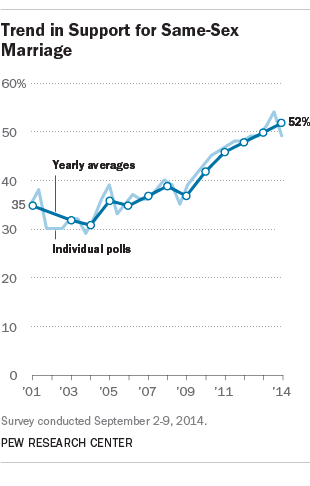 These are among the key findings from a new survey by the Pew Research Center, conducted Sept. 2-9 among 2,002 U.S. adults. The survey tracks public attitudes about religion in public life, maps the contours of the religious elements of the political landscape heading into the 2014 midterm elections and monitors trends on important social issues.
These are among the key findings from a new survey by the Pew Research Center, conducted Sept. 2-9 among 2,002 U.S. adults. The survey tracks public attitudes about religion in public life, maps the contours of the religious elements of the political landscape heading into the 2014 midterm elections and monitors trends on important social issues.
It finds a slight drop in support for allowing gays and lesbians to marry, with 49% of Americans in favor and 41% opposed – a 5-point dip in support from a February Pew Research poll, but about the same level as in 2013. It is too early to know if this modest decline is an anomaly or the beginning of a reversal or leveling off in attitudes toward gay marriage after years of steadily increasing public acceptance. Moreover, when the February poll and the current survey are combined, the 2014 yearly average level of support for same-sex marriage stands at 52%, roughly the same as the 2013 yearly average (50%).
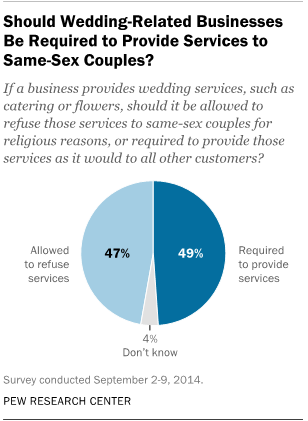 The new poll also finds that fully half (50%) of the public now considers homosexuality a sin, up from 45% a year ago. And nearly half of U.S. adults think that businesses like caterers and florists should be allowed to reject same-sex couples as customers if the businesses have religious objections to serving those couples.
The new poll also finds that fully half (50%) of the public now considers homosexuality a sin, up from 45% a year ago. And nearly half of U.S. adults think that businesses like caterers and florists should be allowed to reject same-sex couples as customers if the businesses have religious objections to serving those couples.
Heading into the 2014 elections, recent Pew Research polls find a great deal of stability in the partisan preferences of religious groups. For example, large majorities of black Protestants, Jews and religiously unaffiliated voters continue to identify with or lean toward the Democratic Party. At the other end of the spectrum, white evangelical Protestant voters continue to be staunchly supportive of the GOP. Nearly three-quarters of white evangelicals identify with or lean toward the Republican Party, and a similar share say they would vote for the Republican congressional candidate in their district.
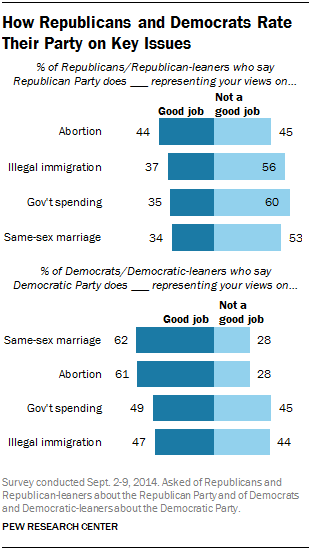 But the new poll also finds some signs of discontent within the GOP among its supporters, including evangelicals. Among Republicans and those who lean toward the GOP, half or more say the party is not doing a good job representing their views on government spending, illegal immigration or same-sex marriage, and they are divided about whether the party is doing a good job representing their views on abortion. Democrats get better ratings from their partisans on all of these issues. Evangelical Republicans who express discontent with the GOP would like to see it move in a more conservative direction on abortion, same-sex marriage and immigration, but non-evangelicals within the GOP are more conflicted over whether the party should move in a more conservative or a more liberal direction on these matters.
But the new poll also finds some signs of discontent within the GOP among its supporters, including evangelicals. Among Republicans and those who lean toward the GOP, half or more say the party is not doing a good job representing their views on government spending, illegal immigration or same-sex marriage, and they are divided about whether the party is doing a good job representing their views on abortion. Democrats get better ratings from their partisans on all of these issues. Evangelical Republicans who express discontent with the GOP would like to see it move in a more conservative direction on abortion, same-sex marriage and immigration, but non-evangelicals within the GOP are more conflicted over whether the party should move in a more conservative or a more liberal direction on these matters.
Among the report’s other key findings:
- A larger share of the general public sees the Republican Party as friendly toward religion (47%) than sees the Democratic Party that way (29%).
- A declining share of Americans see the Obama administration as friendly toward religion; 30% now say the Obama administration is friendly toward religion, down 7 points since 2009.
- About six-in-ten Americans say it is important for members of Congress to have strong religious beliefs (59%), a figure that has not changed significantly since the most recent midterm campaign in 2010.
- Roughly two-thirds of U.S. adults (65%) think gays and lesbians face a lot of discrimination in the U.S. today, and half or more say the same about Hispanics (50%), blacks (54%) and Muslims (59%). Fewer think that Jews (32%), evangelical Christians (31%), atheists (27%) and Catholics (19%) face a lot of discrimination today.
- About a third of evangelical Christians (34%), including 42% of white evangelical Protestants, and one-in-five Catholics (18%) say it has become more difficult to be a member of their religious group in recent years. Roughly one-in-ten religious “nones” (8%) say it has become harder to be a person with no religion in the U.S. in recent years, while 31% say it has become easier. About half or more in each of these groups say the ease or difficulty of being a member of their group hasn’t changed much either way.


